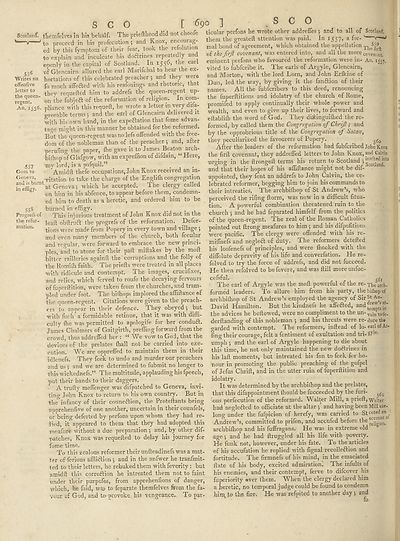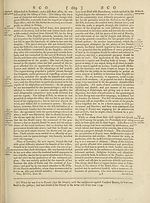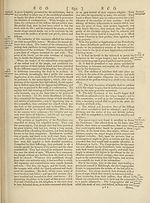Encyclopaedia Britannica, or, a Dictionary of arts, sciences, and miscellaneous literature : enlarged and improved. Illustrated with nearly six hundred engravings > Volume 18, RHI-SCR
(728) Page 690
Download files
Complete book:
Individual page:
Thumbnail gallery: Grid view | List view

SS5
Writes an
offenfive
letter to
the queen-
regent
SSI
Goes to
Geneva,
and is burnt
in effigy
558 r
Progrefs of
the refor¬
mation.
s c
Scotland", themfelves in liis behalf.
v'™'' -' to proceed in his profecution ; and Knox, encourag¬
ed by this fymptom of their fear, took the refolution
to explain and inculcate his doftrines repeatedly and
openly in the capital of Scotland. In I55^> eai^
of Glencairn allured the earl Marifcbal to hear the ex¬
hortations of this celebrated preacher 5 and they were
fo much affedled with his reafonings and rhetoric, that
thev requefted him to addrefs the queen-regent up-
•egent. on the fubjea of the reformation of religion. In com-
An. 1556. pliance with this requeft, he wrote a letter in very dila-
greeable terms) and the edrl of Glencairn delivered it
with his own hand, in the expeflation that fome advan¬
tage might in this manner be obtained for the reformed.
But the queen-regent wasnolefs offended with the free¬
dom of the nobleman than of the preacher ; and, after
peruling the paper, (he gave it to James Beaton arch-
bifhop of Glafgow, with an expreffion of difdam, litre,
my lord, is a parquil.”
^Amidft thefe occupations, John Knox received an in¬
vitation to take the charge of the Englifli congregation
at Geneva } which he accepted. I he clergy called
on him in his abfence, to appear before them, condemn¬
ed him to death as a heretic, and ordered him to be
burned in effigy.
This injurious treatment of John Knox did not in the
leaft obdruft the progrefs of the reformation. Defer-
tions were made from Popery in every town and village j
and even many members of the church, both fecular
and regular, were forward to embrace the new princi¬
ples, and to atone for their pail miftakes by the moft
bitter railleries againfl the corruptions and the folly of
the Romiffi faith. The priefts were treated in all places
with ridicule and contempt. The images, crucifixes,
and relies, which ferved to roufe the decaying fervours
of fuperflition, were taken from the churches, and tram¬
pled under foot. The biffiops implored the affiftance ©f
the queen-regent. Citations were given to the preach¬
ers to appear in their defence. 1 hey obeyed ^ but
with fuch a formidable retinue, that it was with diffi¬
culty ffie was permitted to apologife for her conduft.
James Chalmers of Gaitgirth, preffing forward from the
crowd, thus addreffed her : “ We vow to God, that the
devices of the prelates ffiall not be carried into exe¬
cution. We are oppreffed to maintain them in their
idlenefs. They feek to undo and murder our preachers
and us; and we are determined to fubmit no longer to
this wickednefs.” The multitude, applauding his fpeecb,
put their hands to their daggers.
A trufty meffenger was difpatched to Geneva, invi¬
ting John Knox to return to his own country. But in
the" infancy of their connexion, the Proteflants being
apprehenfive of one another, uncertain in their counfels,
or being deferted by perfons upon whom they had re¬
lied, it appeared to them that they had adopted this
meafure without a due preparation •, and, by other dif-
patches, Knox was requefted to delay his journey for
force time.
To this zealous reformer their unfteadinefs was a mat¬
ter of ferious affii&ion ; and in the anfwer he transmit¬
ted to their letters, he rebuked them with feverity : but
amidft this correction he intreated them not to faint
under their purpofes, from apprehenfions of danger,
which, he faid, was to feparate themfelves from the fa¬
vour of God, and to provoke his vengeance. To par-
O [ 690 ] SCO
The priefthood did not choofe ticular perfons he wrote other addreffes
and to all of Scotland,
them the greateft attention was paid. In 1557, a for- ’ v—
mal bond of agreement, which obtained the appellation
of the fir ft covenant, was entered into, and all the more ceven int>
eminent perfons who favoured the reformation were in- An. 1537,
vited to fubferibe it. The earls of Argyle, Glencairn,
and Morton, with the lord Lorn, and John Erlkine of
Dun, led the way, by giving it the fanClion of their
names. All the fublcribers to this deed, renouncing
the fuperftitions and idolatry of the church of Rome,
promifed to apply continually their whole power and
wealth, and even to give up their lives, to forward and
eftabliffi the word of God. They diftinguiffied the re¬
formed, by called them the Congregation of Chrift ; and
by the opprobrious title of the Congregation of Satan,
they peculiarized the favourers of Popery. s(y0
After the leaders of the reformation had fubferibed John Knox
the firft covenant, they addreffed letters to John Knox, and Caiyjn
urging in the ftrongeft terms his return to Scotland i s^odatlt0
and that their hopes of his affiftance might not be dif-
appointed, they fent an addrefs to John Calvin, the ce¬
lebrated reformer, begging him to join his commands to
their intreaties. The archbiffiop of St Andrew’s, who
perceived the rifing ftorm, was now in a difficult fitua-
tion. A powerful combination threatened ruin to the
church ; and he had feparated himfelf from the politics
of the queen-regent. The zeal of the Roman Catholics
pointed out ftrong meafures to him ; and his difpofitions
were pacific. The clergy were offended with his re-
miffnefs and negleft of duty. The reformers detefted
his loofenefs of principles, and were ffiocked with the
diffolute depravity of his life and converfation. He re-
folved to try the force of addrefs, and did not fucceed.
He then refolved to be fevere, and was ftill more unfuc-
cefsful.
The earl of Argyle was the moft powerful of the re- Ti)e arc!l.
formed leaders. To allure him from his party, the biffiopof
archbiffiop of St Andrew’s employed the agency of Sir St An-
David Hamilton. But the kindnefs he affetted, and
the advices he beftowed, were no compliment to the un- vain to fe.
derftanding of this nobleman j and his threats were re- duce th#
garded with contempt. The reformers, inftead of lo-earlofAr.
fing their courage, felt a fentiment of exultation and tri-gyle*
umph •, and the earl of Argyle happening to die about
this time, he not only maintained the new dottrines in
his laft moments, but intreated his fon to feek for ho¬
nour in promoting the public preaching of the gofpel
of Jefus Chrift, and in the utter ruin of fuperftition and
idolatry.
It was determined by the archbiffiop and the prelates,
that this difappointment ftiould be fucceeded by the furi- ^
ous perfecution of the reformed. W alter Mill, a prieft,\yaiter
had neglefted to officiate at the altar j and having been Mill ese-
long under the fufpicion of herefy, was carried to Stcutedoft^
Andrew’s, committed to prifon, and accufed before the^°”"n<
archbiftiop and his fuffragans. He was in extreme old a
age and he had ftruggled all his life with poverty.
He funk not, however, under his fate. To the articles
of his accufation he replied with fignal recolle&ion and
fortitude. The firmnefs of his mind, in the emaciated
ftate of his body, excited admiration. The infults of
his enemies, and their contempt, ferve to difeover his
fuperiority «ver them. When the clergy declared him
a heretic, no temporal judge could be found to condemn
hin\ to the fire. He was refpited to another day j and
Writes an
offenfive
letter to
the queen-
regent
SSI
Goes to
Geneva,
and is burnt
in effigy
558 r
Progrefs of
the refor¬
mation.
s c
Scotland", themfelves in liis behalf.
v'™'' -' to proceed in his profecution ; and Knox, encourag¬
ed by this fymptom of their fear, took the refolution
to explain and inculcate his doftrines repeatedly and
openly in the capital of Scotland. In I55^> eai^
of Glencairn allured the earl Marifcbal to hear the ex¬
hortations of this celebrated preacher 5 and they were
fo much affedled with his reafonings and rhetoric, that
thev requefted him to addrefs the queen-regent up-
•egent. on the fubjea of the reformation of religion. In com-
An. 1556. pliance with this requeft, he wrote a letter in very dila-
greeable terms) and the edrl of Glencairn delivered it
with his own hand, in the expeflation that fome advan¬
tage might in this manner be obtained for the reformed.
But the queen-regent wasnolefs offended with the free¬
dom of the nobleman than of the preacher ; and, after
peruling the paper, (he gave it to James Beaton arch-
bifhop of Glafgow, with an expreffion of difdam, litre,
my lord, is a parquil.”
^Amidft thefe occupations, John Knox received an in¬
vitation to take the charge of the Englifli congregation
at Geneva } which he accepted. I he clergy called
on him in his abfence, to appear before them, condemn¬
ed him to death as a heretic, and ordered him to be
burned in effigy.
This injurious treatment of John Knox did not in the
leaft obdruft the progrefs of the reformation. Defer-
tions were made from Popery in every town and village j
and even many members of the church, both fecular
and regular, were forward to embrace the new princi¬
ples, and to atone for their pail miftakes by the moft
bitter railleries againfl the corruptions and the folly of
the Romiffi faith. The priefts were treated in all places
with ridicule and contempt. The images, crucifixes,
and relies, which ferved to roufe the decaying fervours
of fuperflition, were taken from the churches, and tram¬
pled under foot. The biffiops implored the affiftance ©f
the queen-regent. Citations were given to the preach¬
ers to appear in their defence. 1 hey obeyed ^ but
with fuch a formidable retinue, that it was with diffi¬
culty ffie was permitted to apologife for her conduft.
James Chalmers of Gaitgirth, preffing forward from the
crowd, thus addreffed her : “ We vow to God, that the
devices of the prelates ffiall not be carried into exe¬
cution. We are oppreffed to maintain them in their
idlenefs. They feek to undo and murder our preachers
and us; and we are determined to fubmit no longer to
this wickednefs.” The multitude, applauding his fpeecb,
put their hands to their daggers.
A trufty meffenger was difpatched to Geneva, invi¬
ting John Knox to return to his own country. But in
the" infancy of their connexion, the Proteflants being
apprehenfive of one another, uncertain in their counfels,
or being deferted by perfons upon whom they had re¬
lied, it appeared to them that they had adopted this
meafure without a due preparation •, and, by other dif-
patches, Knox was requefted to delay his journey for
force time.
To this zealous reformer their unfteadinefs was a mat¬
ter of ferious affii&ion ; and in the anfwer he transmit¬
ted to their letters, he rebuked them with feverity : but
amidft this correction he intreated them not to faint
under their purpofes, from apprehenfions of danger,
which, he faid, was to feparate themfelves from the fa¬
vour of God, and to provoke his vengeance. To par-
O [ 690 ] SCO
The priefthood did not choofe ticular perfons he wrote other addreffes
and to all of Scotland,
them the greateft attention was paid. In 1557, a for- ’ v—
mal bond of agreement, which obtained the appellation
of the fir ft covenant, was entered into, and all the more ceven int>
eminent perfons who favoured the reformation were in- An. 1537,
vited to fubferibe it. The earls of Argyle, Glencairn,
and Morton, with the lord Lorn, and John Erlkine of
Dun, led the way, by giving it the fanClion of their
names. All the fublcribers to this deed, renouncing
the fuperftitions and idolatry of the church of Rome,
promifed to apply continually their whole power and
wealth, and even to give up their lives, to forward and
eftabliffi the word of God. They diftinguiffied the re¬
formed, by called them the Congregation of Chrift ; and
by the opprobrious title of the Congregation of Satan,
they peculiarized the favourers of Popery. s(y0
After the leaders of the reformation had fubferibed John Knox
the firft covenant, they addreffed letters to John Knox, and Caiyjn
urging in the ftrongeft terms his return to Scotland i s^odatlt0
and that their hopes of his affiftance might not be dif-
appointed, they fent an addrefs to John Calvin, the ce¬
lebrated reformer, begging him to join his commands to
their intreaties. The archbiffiop of St Andrew’s, who
perceived the rifing ftorm, was now in a difficult fitua-
tion. A powerful combination threatened ruin to the
church ; and he had feparated himfelf from the politics
of the queen-regent. The zeal of the Roman Catholics
pointed out ftrong meafures to him ; and his difpofitions
were pacific. The clergy were offended with his re-
miffnefs and negleft of duty. The reformers detefted
his loofenefs of principles, and were ffiocked with the
diffolute depravity of his life and converfation. He re-
folved to try the force of addrefs, and did not fucceed.
He then refolved to be fevere, and was ftill more unfuc-
cefsful.
The earl of Argyle was the moft powerful of the re- Ti)e arc!l.
formed leaders. To allure him from his party, the biffiopof
archbiffiop of St Andrew’s employed the agency of Sir St An-
David Hamilton. But the kindnefs he affetted, and
the advices he beftowed, were no compliment to the un- vain to fe.
derftanding of this nobleman j and his threats were re- duce th#
garded with contempt. The reformers, inftead of lo-earlofAr.
fing their courage, felt a fentiment of exultation and tri-gyle*
umph •, and the earl of Argyle happening to die about
this time, he not only maintained the new dottrines in
his laft moments, but intreated his fon to feek for ho¬
nour in promoting the public preaching of the gofpel
of Jefus Chrift, and in the utter ruin of fuperftition and
idolatry.
It was determined by the archbiffiop and the prelates,
that this difappointment ftiould be fucceeded by the furi- ^
ous perfecution of the reformed. W alter Mill, a prieft,\yaiter
had neglefted to officiate at the altar j and having been Mill ese-
long under the fufpicion of herefy, was carried to Stcutedoft^
Andrew’s, committed to prifon, and accufed before the^°”"n<
archbiftiop and his fuffragans. He was in extreme old a
age and he had ftruggled all his life with poverty.
He funk not, however, under his fate. To the articles
of his accufation he replied with fignal recolle&ion and
fortitude. The firmnefs of his mind, in the emaciated
ftate of his body, excited admiration. The infults of
his enemies, and their contempt, ferve to difeover his
fuperiority «ver them. When the clergy declared him
a heretic, no temporal judge could be found to condemn
hin\ to the fire. He was refpited to another day j and
Set display mode to:
![]() Universal Viewer |
Universal Viewer | ![]() Mirador |
Large image | Transcription
Mirador |
Large image | Transcription
Images and transcriptions on this page, including medium image downloads, may be used under the Creative Commons Attribution 4.0 International Licence unless otherwise stated. ![]()
| Permanent URL | https://digital.nls.uk/193028171 |
|---|
| Attribution and copyright: |
|
|---|
| Description | Ten editions of 'Encyclopaedia Britannica', issued from 1768-1903, in 231 volumes. Originally issued in 100 weekly parts (3 volumes) between 1768 and 1771 by publishers: Colin Macfarquhar and Andrew Bell (Edinburgh); editor: William Smellie: engraver: Andrew Bell. Expanded editions in the 19th century featured more volumes and contributions from leading experts in their fields. Managed and published in Edinburgh up to the 9th edition (25 volumes, from 1875-1889); the 10th edition (1902-1903) re-issued the 9th edition, with 11 supplementary volumes. |
|---|---|
| Additional NLS resources: |
|

